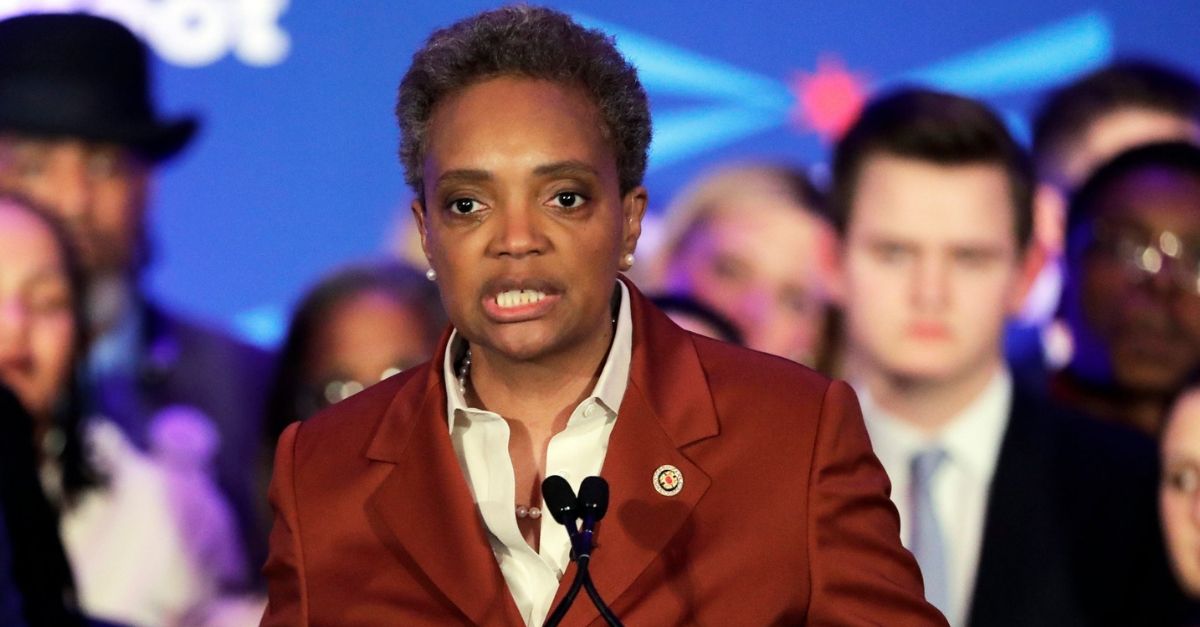Lori Lightfoot was inaugurated on Monday as Chicago's first Black lesbian mayor after winning the seat in a landslide victory last month.
The former U.S. prosecutor used her position as a political outsider to emerge from a crowded primary field and handily beat longtime Chicago politician Toni Preckwinkle. Although she won with almost 75% of the vote, she faces a city in crisis both financially and politically.
"I think the most historic thing was beating the old, entrenched Chicago machine and getting such a resounding mandate for change. We are a proud city with a proud history," Lightfoot said during her speech on Monday.
"In this moment, I can't help but look at all of you and think about what lies ahead and what we can be together."
Lightfoot now takes over America's third largest city from Rahm Emmanuel, a former Obama aide who served two tumultuous terms as mayor. He was criticized heavily for his handling of the shooting of Laquan McDonald and for closing dozens of schools in Black neighborhoods.
In front of her 90-year-old mother, wife and daughter, Lightfoot spoke about her priorities for the city and what she hoped to achieve as mayor.
"I'm looking ahead to a city of safe streets and strong schools for every child regardless of neighborhood or zip code. A city where people want to grow old and not flee. A city of sanctuary against fear where no one must hide in the shadows. A city that is affordable for families and seniors, and where every job pays a living wage," she said.
"A city of fairness and hope and prosperity for the many, not just for the few, a city that holds equity and inclusion as our guiding principles."
Lightfoot is facing a wide variety problems as she enters office. The city is looking at a $700 million budget deficit and local politicians have already balked at her desire to end some of their brazenly corrupt practices. In addition to the challenges she faces from the traditional Chicago political machine, activists have also been less than enthusiastic about her win.
She was criticized heavily during the race for suggesting that the public schools closed by former mayor Emmanuel should be turned into police academies and activists have slammed her opposition to rent controls that protect the city's dwindling Black population.
Activists have pointed to her past ties to the police as problematic and even started a hashtag #StopLightfoot.
She was brought into Chicago politics to clean up Rahm's messes: Lightfoot was appointed by Rahm to the Police Accountability Taskforce to clean up the mess he caused by covering up the police murder of #LaquanMcDonald. #StopLightfoot
pic.twitter.com/dEMFnHCJPu— For the People (@ForThePeopleChi) March 25, 2019
Part of what propelled Lightfoot into office was a wide-ranging corruption scandal that ensnared her opponent. During the election and after her win, she made it a priority to take on Chicago's persistent issues like gun violence and public teacher pay.
“We have an outsize structural deficit, a persistent and growing pension debt, and other costs that that threatens our financial stability. We are spending a significant percentage of every dollar just to service our pension debt alone and too much of that money is being sent to banks and Wall Street bond firms instead of going to our rebuild our neighborhoods, reduce our property taxes and revitalize our transportation system,” Lightfoot told the crowd on Monday.
"Our challenges are great, there's not mistaking that. But if we follow these four stars — safety, schooling, stability and integrity — we can once again become a city that families want to move to, not run away from."
